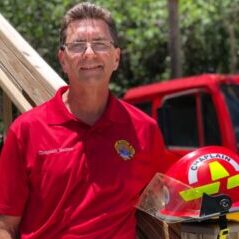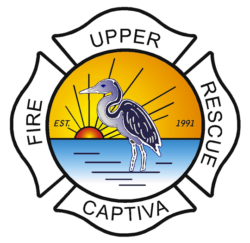Chaplain
Generally, a Fire Chaplain is one who takes on the role of providing spiritual and other support to those in the fire service and those affected by emergency crisis. The specific role of the Fire Chaplain in each department is determined by an agreement with the Fire Chief as to the specific role and duties of the position. The Fire Chaplain is non-denominational and non-sectarian, ministering equally to people of all faith traditions or those with no faith tradition at all.
For the UCFRD, the Chaplain is a volunteer (non-paid) staff position. The Chief has committed to support the Chaplain position by providing basic needs such as turn out gear, uniform, and funding of some essential training. This arrangement provides benefit to the District and the Chaplain to help insure the most effective support is being provided to the District, and that the protections of confidentiality provided to Chaplains under Florida and Federal laws are in effect.

David Bolme
Chaplain
Email: chaplain@uppercaptivafire.org
- Care to the Chief and Assistant Chief – Unlike the other firefighters serving on the island, the Chief and Assistant Chief have no access to a Fire Chaplain from their “primary” department. Direct care is needed for these men to ensure they have access to support as needed and confidential source of counsel for mental, spiritual, and physical matters.
- Care to Firefighters – While each of the forty or so firefighters serving our department on rotating shifts may have access to a Chaplain at their department, it is also a benefit to have access to a Chaplain while here on the island as a primary resource in case an urgent need arises. Also, not every department has a Chaplain, so those without support have a source of help as needed. Knowing and being known by those firefighters is a critical part of the Chaplain’s work.
- Care to Those Affected by Emergency Crisis – Residents and guests to our island regularly require emergency care from the firefighters. During those calls for aid, there is an opportunity for help by the Chaplain including direct comfort to the patient, comfort and help to the family/friends of the patient, and logistical help to those left on island when a patient is transported to the mainland for emergency care. In more extreme cases, there is a plan to create a more formal approach to aid families who may have experienced the death of a loved one while on island.
- Logistical Support to Firefighter Responses for Service – When significant events occur that requires response of emergency equipment and resources, there are several support activities the Chaplain may provide to allow the firefighters to focus on the crisis more effectively. Examples of these duties include traffic and crowd control near response scenes, meeting and transporting off-island firefighters to the emergency scene, setting up the ambulance for recovery sessions during a fire, providing extra hands and eyes to identify spot fires, help on search and rescue missions in the state land, or just being available to the Incident Commander on scene for any other support activities.
- Learning – Continuing education in the form of online self-study, in classroom certification learning, books, and informal study of fire department culture, all focused on becoming a more effective and helpful resource.
- Planning and Preparation – The Chaplain meets regularly with the Chief, Assistant Chief, and other identified resources to plan for the most likely events that are to be supported. In doing so, each person knows their role and how to respond in each type of event.
- Practice – While preparation and planning are particularly important, actually exercising those plans and theories are the most helpful in being prepared to execute in the time of a crisis. The Chaplain is regularly involved in working with those tools and resources that he is most likely to execute.
- Mentor/Accountability Partner – In order to continue to mature in the Chaplaincy, the Chaplain meets weekly with a more experienced Chaplain. This achieves both a growing relationship and accountability for the Chaplain.
- Peers – It is important to have relationships with other Chaplains in order to have a peer group of support and experience from which to draw. The Chaplain meets each week with a group of Chaplains from across the country on a Zoom call, continuing to build relationships, hear speakers on topics of interest, and take part in meaningful discussions as to common practice or practical methods of performing the role of a Fire Chaplain.

